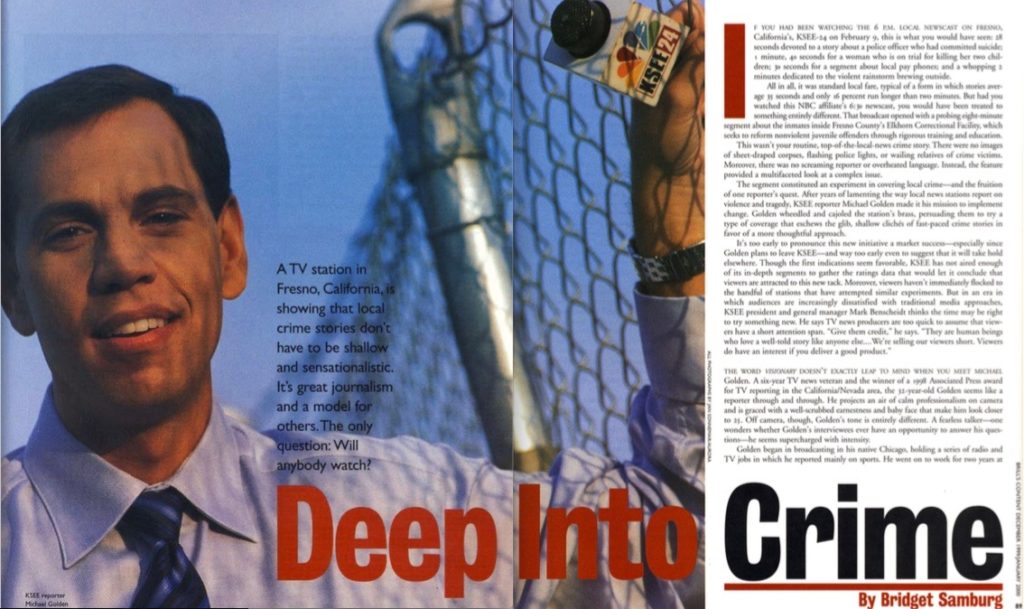The chicken or the egg? Trump’s lead in the polls or the media’s sycophantic coverage of Trump? The media’s hyperactive coverage of the circus, or the circus’s irresistibly magnetic power over the media? Which comes first? Which feeds which? And does it matter?
The answer, of course, will depend on whom you ask. But once in a while, we get a rare moment of clarity. And when it comes from a veteran journalist speaking on a national platform, it is worth repeating – and examining.
Matt Bai has worked as a correspondent for Newsweek, The New York Times, and is now the national political columnist for Yahoo News. Last weekend, on NBC’s Meet the Press, Bai threw a bright yellow penalty flag on all of his political journalism brethren:
“We treat presidential politics and politics in general like a reality show and we have for years… We order up every kind of garbage poll you can find. We literally treat our candidates as contestants on a game show to be voted off or vote on. And I think there’s a cost for that and the cost is that you set up a platform where someone like a Donald Trump can come and exploit it very handily, because he is the perfect reality show candidate. And I think at this point there is this symbiosis with the media and Trump. I think at this point he has to be covered to the extent that he is because he is clearly leading, late in the campaign in the polls. But there’s a long period in this campaign where I think we exaggerated his support because it brought ratings and it brought clicks and it was the great shiny story of the campaign. And I think we did a great disservice to the country.”
Wow. It felt as if I’d written the script myself. Or perhaps Bai has been reading my posts or listening to me yell at the television screen for months – alone in my office. Of course, the observation itself is not all that original. It’s just something that we don’t often hear on Meet The Press on Sunday morning, in front of a panel of other political journalists.
So which came first? Was the press immediately drawn to Trump during his opening speech when he tossed out “they’re rapists”? Was he a serious enough candidate at that point (a first timer at his first announcement) to warrant the rerunning of that video countless times? Or was it broadcast and written about and commented upon due to its shock value and the audience it would suck in? I would argue the latter, hands down.
And then they were off to the races, or more accurately in this circumstance, off to the media circus – conducted by its raging ringmaster. Sixteen other Republican candidates were yanking their hair out every day watching what seemed like the 1976 movie Network come to life. After working in politics and government for decades and choosing their words and making decisions as responsibly as they thought they could, a crude outsider tapped into an authentic American anger – and he could say anything he wanted. Reporters would be right there to scoop it up. Regurgitate it. Again and again.
If Trump is on the phone with one host, it is bannered “exclusive.” This makes no sense, of course, unless it means he’s only on that particular call at that moment. Trump runs his mouth with everyone because he knows full well they’ll listen and hit the record button. He admits this out loud, right to the cameras. He looks into the live national network lenses, points, and then accuses them of broadcasting his rally (show) to get high ratings – and he’s right.
A few nights ago, I listened to political analysts discuss the meaning of the word “schlonged” in different contexts, its Yiddish origins, and how long the average bathroom break takes a woman versus a man – on national television news in prime time. Imagine if Walter Cronkite could have seen this display.
But right there is the hook in this scenario. We are a long way from the media world in which Cronkite’s trusted voice had such broad reach. The “news media” itself has gone through a metamorphosis since that era. We now live in a fragmented media universe with cable and digital and thousands of outlets screaming their best to steal minutes here and there from our whittled-down attention spans. The competition over ratings on television news is fierce and it is fought over a constantly shrinking pie. And there’s the rub.
Many years ago when I was working as a local television news reporter, I felt this same frustration over what I was assigned to cover versus what I thought we should be covering. I was the nerd who liked reporting on politics and education and issues surrounding race and poverty. My producers liked sending me to cover “breaking news” because I could speak well live without notes in front of dramatic images that were manna for the cameras. Murders, fires, hostage situations, fugitive chases – all the sensational stuff that draws eyeballs but gives no context about what it means for the community at large (if anything). Most of the time I hated it and argued with my producers over its news value. But I must also confess that at times I absolutely got sucked into the infotainment nature of stories that I knew viewers would like – if not learn anything from. A culture develops and can be contagious, despite best intentions.
The truth is that news operations are for the most part housed inside corporations. The number of viewers or readers determines advertising and subscription rates, which translates into a bottom line for the company. It’s not complicated, but to be clear, this is why the challenge is so difficult for many of the hosts, reporters and producers that Bai rightly accuses of turning news into a reality show. There are so many veteran political reporters and program moderators whom I have great respect for – because they do try to provide relevant information to voters about what each candidate would do if they achieved the power of the political office they’re pursuing. But they’re also forced to play the game. When Trump is shooting his mouth off on one network, that network’s competitors will be hard-pressed to completely ignore him for too long, lest hundreds of thousands of fingers click on remotes to follow the sideshow. Lost viewers. Lower ratings. Less revenue.
In 1999, at KSEE-TV (NBC) in Fresno, California, I became so frustrated with the sensationalism of television news that I sought out and received a media fellowship grant from the Center on Crime, Communities and Culture at the Open Society Institute in New York. I was funded to write, report and produce a series of long-form segments on criminal justice – after receiving community input on how we could improve that coverage. Six months later, the same panel of community leaders joined my two main anchors in our production studio and watched the segments (I left the studio). These leaders then answered questions, on camera, as to whether the pieces I reported added context and provided value for our viewers. To the station’s credit, the general manager let me roll it all into a one-hour documentary, Behind The Crime – and bumped Dateline to run it without commercials.

I left KSEE-TV two weeks after that program aired and moved back to Chicago to start a new career. I just couldn’t go back to the daily pack journalism I had publicly railed against for too long. To this day, I am proud of the photographers, producers, assignment editors and reporters who worked alongside me on that project. It was a team effort; my colleagues were also friends and they were actually eager to help. But there is no question that it would not have happened within the usual course of the daily news business. Without a financial grant to pay for the extra man hours, and a brand new 4:30 p.m. news program that actually needed more content which allowed my longer pieces to run, it would have been just a silly idea from an idealistic reporter.
This is why Bai’s remarks resonated so much with me when I heard them. And I hope his commentary sparks a larger discussion in newsrooms and college journalism departments across the country. The pressures of the business side of the news business will not go away. Ratings and subscription levels and click rates are real considerations. Corporations are not classrooms. This is why it will never be easy for journalism professionals to always do the right thing – even when their instincts tells them to. It’s still a job – and jobs lead to paychecks which support livelihood. These are the facts. But at the very same time, the more we vocally define and demand virtue from our media “watchdogs,” the more reason they will have to at least consider the coverage they are providing – the decisions they are making, the internal fights they are waging about those decisions.
With a new year upon us, here’s hoping we receive the kind of presidential election coverage that will equip us as citizens to cast informed votes. Pushing for this outcome should not resemble some naïve wish, for it is one of the core tenets of journalism. In the media environment of 2016, it’s a goal that may be more difficult than ever before to achieve – which is precisely why we so desperately need it.


